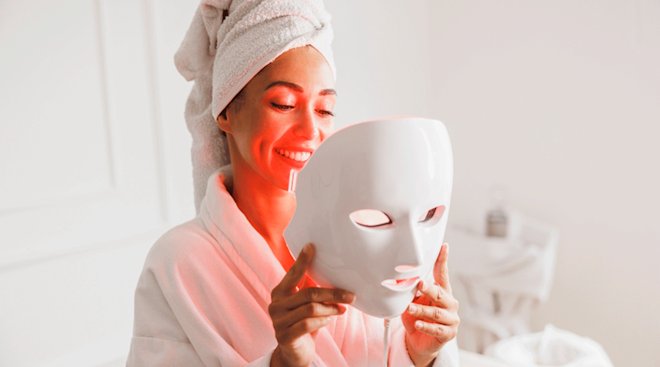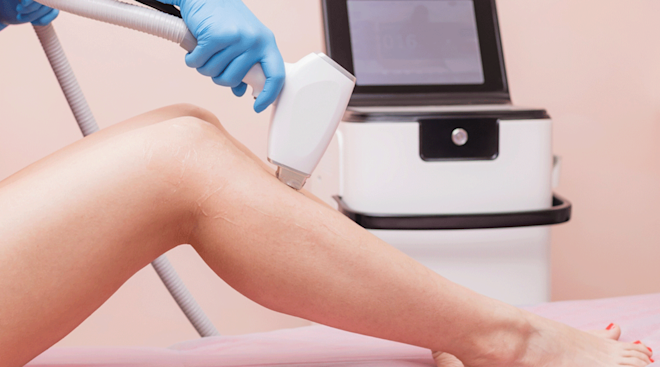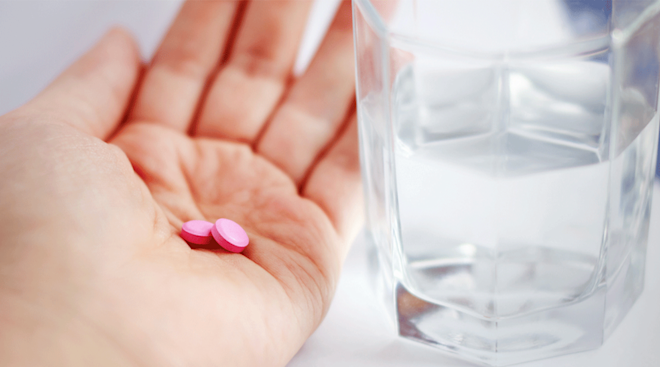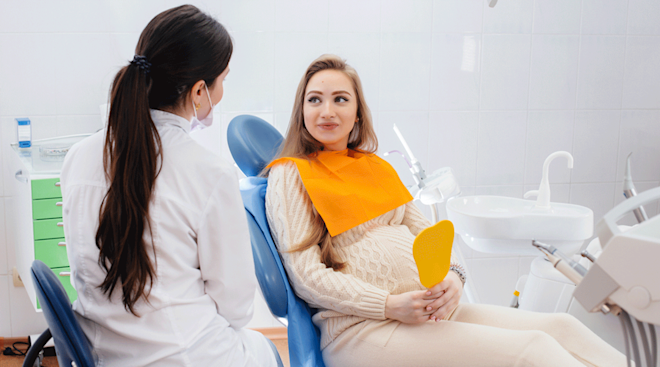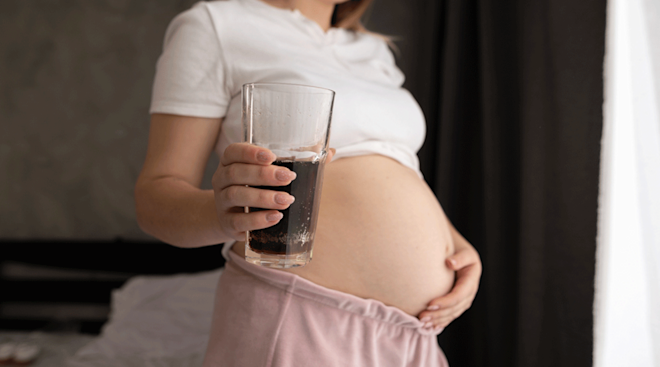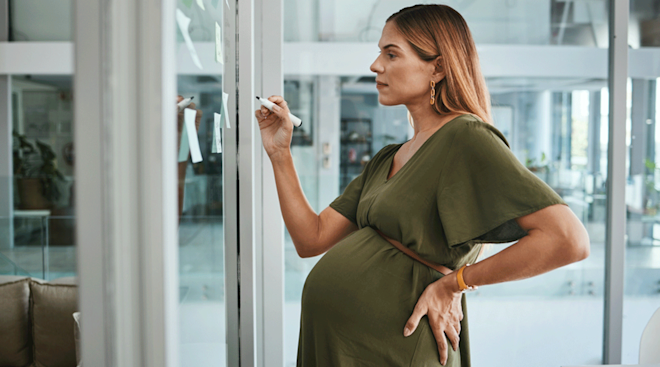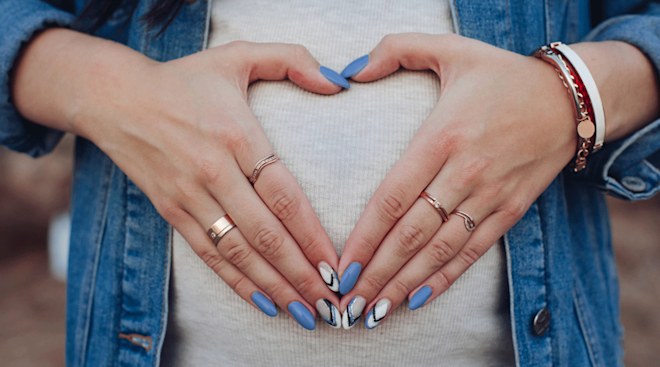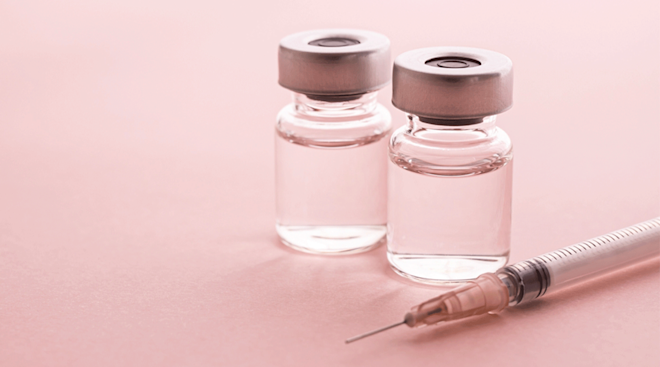Can You Use Retinol While Pregnant?
Retinol is a powerhouse skincare ingredient that treats everything from fine lines to stubborn acne. You may have reached for it before getting that positive pregnancy test. But now that you’re expecting, there are lots of new considerations, from what foods to avoid to what skincare products to steer clear of.
“I was at the mall picking up some makeup, and the girl at the counter recommended I call and check about the products I’m using for retinol since I’m pregnant,” shares The Bump community member AshMarie20. “I called the company, and the eye cream and overnight cream both have retinol derivatives in them. Obviously I’m going to stop using them from now on, but I’m worried about past usage. Eek!”
While you shouldn’t panic if you’ve used a small amount, it’s a good idea to read up on the potential risks of retinol during pregnancy, since it’s generally not considered safe. Ahead, experts explain what you need to know about using retinol while pregnant.
- Experts don’t recommend using topical retinol while pregnant (or breastfeeding), since it could raise vitamin A levels in your blood, which could harm baby.
- Retinoids—which are even stronger than retinol—are also off limits during pregnancy.
- If you’re looking to continue your acne or anti-aging skincare routine while pregnant, there are gentler products you can use. Experts recommend ingredients such as bakuchiol, which can help smooth fine lines.
Retinol is a derivative of vitamin A, explains Gary Goldenberg, MD, assistant professor of dermatology and pathology at the Icahn Sinai School of Medicine at Mount Sinai in New York City. The ingredient’s effect on your skin “enhances cellular turnover and collagen synthesis, making retinol important in dermatology and anti-aging medicine,” he says.
Retinol is typically available over-the-counter as a topical form of vitamin A. “It’s weaker than the prescribed retinoid versions,” says Pooja Sodha, MD, FAAD, an associate professor of dermatology at the George Washington University School of Medicine and Health Sciences.
If you’re all about skincare, it’s likely you’ve wondered whether you can continue using retinol during pregnancy. Unfortunately, most experts recommend against it.
Is retinol safe while pregnant?
“Studies show a 1-to-2 percent absorption of retinol through the skin,” Goldenberg says. This absorption can potentially raise the vitamin A in your blood to levels that are dangerous to baby’s development, he explains. For this reason, retinol is not considered safe while pregnant.
I sell skincare, so I’ve learned a lot about this since several of my clients (and now me!!) are pregnant. As long as you’re not using a product that has vitamin A, retinol or Retin-A as the main ingredient, you should be fine. I would also mention it at your next appointment.
Again, the biggest risk of using retinol while pregnant is that it can raise your vitamin A to teratogenic levels (aka, bad for baby). “High doses of vitamin A, especially in the form of retinoids, have been linked to birth defects,” says Wendy Wilcox, MD, MPH, an ob-gyn and chief women’s health officer at NYC Health + Hospitals.
“Retinol can cause certain genes in a developing pregnancy to be expressed abnormally,” explains Michael Baldonieri, MD, assistant professor of reproductive biology at the Case Western Reserve University School of Medicine. “These genes specifically control the way the head, brain and spine are developed and oriented. When disrupted by medications like retinol, severe birth defects can occur that can cause significant disability or death before delivery.”
While oral retinoids, like isotretinoin for acne (formerly known by the brand name Accutane), are “especially risky” due to the risk of birth defects, all forms of retinol during pregnancy are considered unsafe, Wilcox says. While it may seem weird that your everyday moisturizer is suddenly off the table, it’s best to play it safe. “Topical skin retinol can be harmful because it can be absorbed into the bloodstream and cause harm to baby,” says Denise Castellanos, CNM, lead midwife at MemorialCare Saddleback Medical Center’s Women’s Health Pavilion in Laguna Hills, California.
If you use retinol, you’ll likely have to audit your medicine cabinet when you learn you’re pregnant. “I recommend a very conservative approach during pregnancy,” says Ife J. Rodney, MD, a board-certified dermatologist and the founding director of Eternal Dermatology + Aesthetics in Fulton, Maryland. This means focusing on gentle cleansers, moisturizers and sunscreens. “Avoid pore-clogging ingredients,” Rodney says. “Less is more during pregnancy.”
If you want something a little more intensive for anti-aging skin effects, Rodney suggests trying products that contain bakuchiol. “This is a plant-based alternative that doesn’t pose the same risks [as retinol],” she says.
Azelaic acid can help with acne and hyperpigmentation, according to Goldenberg. “It appears to be safe in pregnancy,” he says. “I advise patients to start using it after the first trimester.”
Hoping you can hop back on the retinol bandwagon as soon as baby makes their big debut? If you’re planning on breastfeeding, you’ll want to rethink this plan. “Caution is advised due to potential transfer to breast milk,” Goldenberg says. Just like with retinol during pregnancy, the big potential concern is vitamin A toxicity, Castellanos says.
Frequently Asked Questions
What other skincare ingredients should you avoid while pregnant?
In addition to retinol, there are a few major skincare ingredients that are best to avoid while pregnant, including salicylic acid and benzoyl peroxide (both typically used for acne), Sodha says. It’s a good idea to switch up your sunscreen too: “I recommend all my patients, pregnant and not, to opt for physical sunscreens containing zinc oxide and titanium dioxide over the chemical sunscreens,” she adds. Lastly, she recommends avoiding topical and oral tetracyclines such as minocycline and doxycycline, used to treat infections and inflammatory conditions—including those of the skin, “as this may have risks in fetal bone and tooth development.”
Does topical retinol get into the bloodstream?
It depends. “The target for retinol activity are the skin cells—keratinocytes—and there’s minimal bloodstream absorption,” Sodha says. “But this depends on the concentration of the product. Since we don’t know the ‘safe’ concentration in the blood during pregnancy, we recommend avoiding this during pregnancy and breastfeeding.”
When should you stop topical retinol before pregnancy?
Of course, it can be hard to predict exactly when you’ll conceive, but Sodha recommends stopping topical retinol at least a month before getting pregnant. If you’re actively trying, she suggests creating a skincare routine that’s free of retinol ASAP.
Is it okay if I accidentally used retinol while pregnant?
Don’t panic if you accidentally used retinol while pregnant. “It’s likely just fine,” Sodha says. But it’s safest to stop using retinol during pregnancy going forward.
Can you use Differin while pregnant?
As Differin gel (adapalene) is a topical retinoid, its use should be discontinued during pregnancy.
How is retinoid different from retinol?
Retinoids are more potent than retinols and are usually used for acne and acne scarring, Sodha explains. “With the exception of adapalene gel, which is available as an over-the-counter version, retinoids require a prescription,” she says. “When discussing treatment with your doctor, share your family-planning goals.”
What is Fetal retinoid syndrome (FRS)?
Fetal retinoid syndrome is a series of severe birth defects resulting from a mom-to-be taking retinoids while expecting.
Retinol can lurk in a lot of beauty and skincare products. While a small amount is likely okay, it’s a great idea to take stock of your skincare stash to make sure you’re not using retinol during pregnancy. Experts recommend ditching the ingredient due to potential vitamin A toxicity, which can harm baby. If you have concerns, make sure to reach out to your healthcare provider.
Please note: The Bump and the materials and information it contains are not intended to, and do not constitute, medical or other health advice or diagnosis and should not be used as such. You should always consult with a qualified physician or health professional about your specific circumstances.
Plus, more from The Bump:
Michael Baldonieri, MD, is an assistant professor of reproductive biology at the Case Western Reserve University School of Medicine. He received his medical degree from Chicago Medical School at Rosalind Franklin University of Medicine and Science.
Denise Castellanos, CNM, is the lead midwife at MemorialCare Saddleback Medical Center’s Women’s Health Pavilion in Laguna Hills, California. She received her degree from California State University, Los Angeles.
Gary Goldenberg, MD, is an assistant professor of dermatology and pathology at the Icahn Sinai School of Medicine at Mount Sinai in New York City. He’s also the co-owner of Goldenberg Dermatology. He received his medical degree from the Temple University School of Medicine.
Ife J. Rodney, MD, FAAD, is a board-certified dermatologist and dermatopathologist and the founding director of Eternal Dermatology + Aesthetics in Fulton, Maryland. She received her medical degree from Howard University College of Medicine.
Pooja Sodha, MD, FAAD, is an associate professor of dermatology at the George Washington University School of Medicine and Health Sciences. She’s also the director of the university’s Center for Laser and Cosmetic Dermatology. She received her medical degree from the Georgetown University School of Medicine.
Wendy Wilcox, MD, MPH, MBA, is an ob-gyn and chief women’s health officer at NYC Health + Hospitals. She received her medical degree from Upstate Medical University in Syracuse, New York.
American Academy of Dermatology Association, Isotretinoin: The Truth About Side Effects, September 2023
Cureus, Vitamin A-Mediated Birth Defects: A Narrative Review, December 2023
Harvard Health Publishing, Harvard Medical School, Bakuchiol: Does It Make My Skin Look Younger?, May 2022
Mayo Clinic, Azelaic Acid (Topical Route), February 2025
National Library of Medicine, Fetal Retinoid Syndrome
Toxicology and Applied Pharmacology, In Vitro and In Vivo Percutaneous Absorption of Retinol from Cosmetic Formulations: Significance of the Skin Reservoir and Prediction of Systemic Absorption, August 2008
UK Teratology Information Service, Use of Adapalene in Pregnancy, November 2022
Real-parent perspectives:
- AshMarie20, The Bump community member
- BLuvsE, The Bump community member
Learn how we ensure the accuracy of our content through our editorial and medical review process.
Navigate forward to interact with the calendar and select a date. Press the question mark key to get the keyboard shortcuts for changing dates.

































